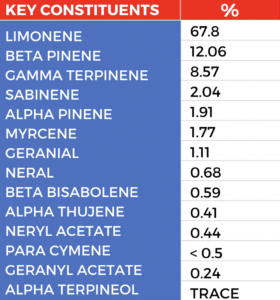Lemon: In Two Minutes
Snapshot
Bright, fresh and citrusy, Lemon oil is only second to Orange oil as most popular citrus oil amongst perfumers and flavorists. Lemon oil brightens prestige perfumes, personal care fragrances, and is essential to blockbuster confectionery and beverage brands. Lemon oil, for example in accord with Calone, is an unmistakable note in fragrances such as Dolce & Gabbana’s Light Blue and Giorgio Armani’s Acqua di Gioia. Lemon oil sparkles in Calvin’s Klein’s One, and its summer flanker. Perhaps most importantly, lemon oil is a hallmark ingredient in Cola flavors.
In the Field
Lemons grow best in sunny, warm climates. Citrus Limomum is  widely grown for commercial purposes. Upon harvest, fruits are sorted for either the produce market, or for “processing”. Lemon processing targets the needs of the lemon juice industry and aroma industries. Essentially, lemon ingredients used in the aroma industries are sophisticated by products of the lemon juice industry.
widely grown for commercial purposes. Upon harvest, fruits are sorted for either the produce market, or for “processing”. Lemon processing targets the needs of the lemon juice industry and aroma industries. Essentially, lemon ingredients used in the aroma industries are sophisticated by products of the lemon juice industry.
Vast Lemon groves are found in Argentina (Tucaman, Salta and Jujuly regions), USA (mainly California, and Arizona), in the Mediterranean basin (incl. Spain, Turkey & Italy) and in South Africa. Spain is world-leading producer of fruit, although 75% of its crop is allocated to the produce markets. Argentina remains the major producer of lemon for the aroma industries, as up to 95% of its crop is allocated to processing into lemon juice and aroma ingredients. Harvest typically occurs in the winter and spring, although the tree may bear fruit sporadically throughout the year. The crop is particularly sensitive to cold spells, as witnessed in Argentina in 2021, whereby extreme cold and ensuing dry weather decreased crop output by as much as 30%.
Organoleptic & Composition
Lemon oil is a top note, typically composed of a bouquet of volatile compounds of a lighter molecular weight, which evaporate faster. Expressed Lemon oil, the most popular of all lemon ingredient, boasts an aroma of squeezed fresh lemon peel: ethereal, zesty, bright fresh and…lemony. Its true-to-the-fruit character remains on the blotter, all the way through dry-down. A clear liquid, its color is pale to deep yellow or greenish-yellow.
all the way through dry-down. A clear liquid, its color is pale to deep yellow or greenish-yellow.
Expressed Lemon oil is rich in terpenes and sesquiterpenes, mainly Limonene followed by much smaller amounts of Beta Pinene, Cis Beta Ocimene, Y-Terpinene, Alpha Pinene, Geranial, Sabine, Myrcene and aldehydes such as citral and citronellal and esters. It is those aldehydes and esters that the folding process seeks to concentrate for more powerful aroma and improved solubility.
Fragrance Formulation
Lemon is favored by perfumers for its versatility in a variety of fragrances, typically as a fresh top note in both men’s & women’s formulations. As early as 1709, Italian perfumer Giovannu Maria Farina formulated lemon oil in a citrus-based instantaneously-fresh Original Eau de Cologne, whose name now permeates our fragrance lexicon. Perfumers often adorn lemon oil with aliphatic aldehydes to enhance its brightness. When formulated with lavender, or other citrusy ingredients like neroli, lemon yields a whimsical, zesty fresh yet grounded earthy character. In accords with fruit esters like green apple or with floral absolutes, lemon finishes off a formulation with an undeniably crisp and fresh signature.
Flavor Formulation
In the flavor industry, lemon oil is arguably one of the most widely used fruity ingredient. On its own, with its mostly-terpenic profile, lemon ingredients are commonly formulated in the likes of candy and lemon baked goods, where it packs a tart punch and sweetness. Most notably, Lemon oil is mainly used in the beverage industry, with a flagship role in popular colas and citrus-flavored soft drinks. Behind the scenes, lemon can enhance other sweet flavors or balance richness in savory flavors.
Due to the solubility issues and off-notes caused by rich content of naturally-occurring terpenes, flavorists prefer to use “folded” (concentrated) lemon oil, because the folding process removes a portion of undesirable terpenes. Acids such as citric acid, lactic acid, tartaric acid are routinely formulated by flavorists and food&beverage technologists to push the aroma of lemon. The aroma of fully de-terpenated oil is up to 25 times stronger than the standard expressed oil.
Aromatherapy Virtues
Aromatherapeutic virtues of lemon oil include mood and relieve stress and support the immune system. Due to its Limonene content, it soothes the digestive system and supports metabolism and immune systems. In natural home care, the antibacterial and antimicrobial properties of lemon oil lend itself well to the formulation of all-natural home spray cleaner.
Vigon’s Collection
Vigon carries a complete collection of Lemon oil ingredients. Our offering covers all key lemon ingredient families and processes in demand by perfumers, flavorists, food & beverage technologists and aromatherapists. Click on links below for pricing, regulatory, technical and safety details. You can also view sensory evaluations of many of these products by watching our In Two Minutes video series.
[fvplayer id=”5″]
ESSENTIAL OIL (refer to Expression process)
#508444 Lemon Oil Colorless (Low Furocoumarin)
ESSENCE (refer to Distillation process)
#501051 Lemon Oil California Distilled
#501886 Lemon Oil Essence REDD
WASHED EXTRACT (refer to Washed Citrus extraction process)
FOLDED OIL (refer to Folded Citrus process)
#501803 Lemon Oil California 2-Fold
#500199 Lemon Oil California 5-Fold
#501335 Lemon Oil Terpeneless WONF
TERPENES (refer to Folded Citrus process)
If you are interested in seeing a sample or placing an order, please email Nicholas Bourne at nbourne@vigon.com or call 570-422-6026.


